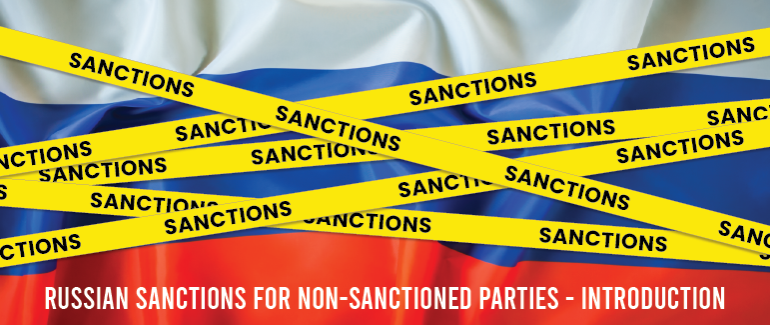
By Timothy Mills, Aliant USA. The crisis in Ukraine has brought many different questions to the legal world, the largest being concerns the position of non-sanctioned businesses with regards to the sanctions imposed on Russia. To answer these questions we present to you our 1st part of the 5-part series on “Conducting International Business and Commercial Transactions for Non-Sanctioned Parties: a 4 Scenarios Case Study”.
In this part we introduce to you a quick summary of the Sanctions against Russia to date, i.e. as of March 18th 2022 and conclude with a discussion by Aliant International Law.
PART ONE
I. INTRODUCTION
As counsellors of businesses throughout the United States, Europe and Asia, and as long-standing practitioners of international economic sanctions law, the attorneys of Aliant International Law are acutely aware that thousands of non-sanctioned businesses throughout the world need to answer extraordinary questions and face stark challenges about how best to minimize the collateral damage that appears to be at hand, while at the same time complying with all applicable sanctions laws.
For example, a non-Russian business with a contract to supply or provide services to a non-sanctioned Russian entity, initially may have believed itself to be clear of potential harm, and therefore, may not have taken appropriate measures when sanctions were just in the officing to reduce or mitigate sanctions risks.
First, when looking at the transaction at that moment, the non-Russian business did not appreciate that its performance of the contract might become frustrated or made impossible by virtue of no longer being able to fulfill the CIF (Carriage, Insurance Freight) requirements, or get paid under a documentary letter of credit for the transaction because, as a consequence of sanctions measures such as closed airspace and shipping prohibitions, freight forwarders no longer are able to arrange carriage, and insurance companies no longer will ensure the goods against risk of loss. Additionally, the non-Russian business may not have appreciated the risk that the letter of credit for the transaction – issued by one of the seven Russian banks that now are blocked from the SWIFT network – in effect will have become non-negotiable by the Negotiating Bank (who negotiates the documents pertinent to the LC that the non-Russian business delivers to the negotiating bank) because the issuing Russian bank has been disconnected from the SWIFT system, resulting in the Negotiating Bank no longer being able to communicate the documents through SWIFT to the issuing Russian bank (i.e., the standard, immutable practice throughout the international banking system).
Second, similarly, by way of example, a non-Russian business that has been a repeat buyer of goods, services or commodities from a non-sanctioned Russian business, also initially believed itself to be clear of sanctions-related risk. Historically, the non-sanctioned Russian business has been an excellent customer of the non-Russian buyer, has always performed satisfactorily, and the financial arrangements (consisting of an LC provider by buyer’s bank) have become routine and completely effective. Now, however, the non-sanctioned Russian business cannot deliver the contracted-for goods, services or commodity, for one or more of the previously-mentioned reasons. And, accordingly, the non-sanctioned Russian business will not obtain or be able to produce the documents necessary for the non-sanctioned Russian business to negotiate the LC. Additionally, the Negotiating Bank for the LC is one of the 7 Russian sanctioned banks who are prohibited from participating in the SWIFT network.
Third, by way of further illustration, your company is a European business that has contracts with Russian enterprises to sell items that embed U.S. technology but did not require an export license issued by the U.S. Department of Commerce Bureau of Industry and Security (BIS) (i.e., microelectronics, telecommunications items, certain software, certain encryption items, sensors and optics, navigation equipment, avionics, marine equipment and aircraft components). You are about to ship, and you see an announcement in the trade press that BIS has changed the rules. But no one has notified you not to ship, and your export agent cannot provide with you definitive answers about what you should or should not do. And, you are not yet certain whether BIS’ jurisdiction to impose new rules binds you, a company in the UK, or the EU, or Switzerland.
Fourth, as a final illustration, you are an EU citizen, a UK resident, and the business agent for a Russian oligarch who owns properties and assets (including a major sports team) in England. The sale of €1 billion asset legally held by your client in the UK, and physically partially located within the EU, has been negotiated and agreed to, with a closing date on 1 March 2022. In late February, your client the oligarch, was placed on the assets freeze sanctions list in the EU for his close ties to Putin, but has not yet been sanctioned by the UK – even though the word is that the UK will act imminently to follow the EU’s lead. However, the UK has sanctioned Russian oligarch Alisher Usmanov (who has links to Everton football club and is your client’s good friend), freezing all of his assets in the UK. Should you continue to assist your client to close the asset sale, and collect the €1 billion 1 billion sale price? What are the legal risks to your client, to you and to the buyer is you do close the asset sale? Where and when does your client move the money? What are the implications for your client and the buyer if the asset sale does not close?
The information provided in this article does not, and is not intended to, constitute legal advice. Instead, these illustrations and the discussion that follows are intended to illustrate the complexities of the business and legal issues now at the forefront of cross-border business in Europe, Switzerland, the UK, the United States, Canada, Japan and Australia now that the 2022 Russian sanctions have turned once-straightforward business dealings between Russian entities and non-Russian counterparts into anything-but-simple high-stakes legal navigational puzzles, as well as to provide some general observations about the attendant legal issues.
II. RUSSIAN SANCTIONS – MARCH 2022 QUICK SUMMARY
Within only a few days after Russia invaded Ukraine on 22 February 2022, the governments of the United States, the European Union, Switzerland, the United Kingdom, Norway, Canada, Japan, Australia, Singapore, New Zealand, South Korea, and the Bahamas (the “Sanctioning Countries”) responded with the most comprehensive-ever constellation of economic and trade sanctions against Russia and Belarus ever seen from nations not at war with the sanctioned parties. Since the initial rounds of sanctions, Russian President Putin has not relented. Instead, Putin has escalated Russia’s military violence in Ukraine, violating the international law of war by targeting, maiming and killing innocent Ukrainian civilians. In response, the Sanctioning Countries have imposed additional rounds of ever more serious sanctions, with new sanctions being announced several times a week.
As of 18 March 2022, sanctions now include:
● Blocking sanctions against the Russian energy sector, including:
▪ Prohibitions on importation of Russian crude, petroleum and petroleum-related products into the U.S.;
▪ Dealings sanctions prohibiting any “U.S. Person” from engaging in any transactions involving Russian crude and petroleum, and petroleum-related products, and the financing of any such prohibited transactions;
▪ Prohibitions by the US and EU against exports to Russia of equipment, technology and services for the Russian energy industry;
▪ Dealings sanctions prohibiting new investment in Russia’s energy sector by any “U.S. Person” – i.e., U.S. citizens, corporations and other business entities, as well as prohibition on any dealings relating to the financing of such sanctioned crude oil purchases;
● UK prohibitions on importation of all Russian crude oil and refined product purchases by the end of 2022.
● Blocking sanctions that prohibit all dealings by citizens and business entities of the Sanctioning Countries against dozens of Russian State-owned companies who themselves have thousands of contracts with non-Russian joint-venture partners and suppliers;
● Blocking sanctions against Russian banks (i.e., sanctions that require the freezing of the sanctioned party’s assets and prohibition on any dealings with the sanctioned party by citizens and business entities of the Sanctioning Countries) that have between stalwarts of Russian President Putin, but also have supported Russian companies with trade finance for activities (such as contracts) with non-Russian counterparties;
● Prohibition against the largest and most powerful Russian and Belarussian banks having access to or using the Society for Worldwide Interbank Financial Telecommunications (SWIFT) systems to conduct financial transactions (SWIFT consists of the systems through which international letters of credit, wire transfers, VISA and Mastercard transactions and most other financial transactions are documented and authorized between international financial institutions);
● EU sanctions prohibiting any EU person or entity from providing credit rating services to any Russian person or entity;
● Prohibitions on exportation, reexportation, sale, or supply of US dollar-denominated currency and any Euro bank notes to the Government of the Russian Federation or any person located in the Russian Federation;
● Blocking sanctions against Russian President Putin and most of the senior political, legislative and military leadership of Russia and Belarus numbering in the hundreds, and also some travel bans, triggering a near-immediate, very frenetic search to locate and seize secreted assets of as many of these sanctioned persons as possible;
● Similar blocking sanctions against dozens of Russian oligarchs (including Sergei Roldugin, formerly a high-profile orchestra cellist, the godfather of Vladimir Putin’s daughter, and also known as “Putin’s wallet:”; Roman Abramovich, owner of the Chelsea Football Club; Gennadiy Timchenko, founder and owner of private investment group Volga Group; Boris Rotenberg, co-owner of the SGM group, the largest construction company for gas pipelines and electrical power supply lines in Russia; and Igor Rotenberg, oldest son and heir to Arkady Rotenberg, Russian billionaire businessman and co-owner with brother Boris Rotenberg, of the SGM group) – thus making the sanctioned oligarchs’ assets in the Sanctioning Countries subject to being frozen.
● Prohibitions on Russian aircraft and vessels from entering the airspace or waters of the Sanctioning Countries, or using any air or sea ports in the Sanctioning Countries; detention of Russian aircraft and vessels found within the waters or ports of Sanctioning Countries; and termination of registration of Russian aircraft in the Sanctioning Countries;
● Prohibitions on unlicensed exports, re-exports and country transfers to Russia and Belarus (in particular to Russian and Belarussian State-owned companies in the military sector) of technology and an expansive list of other items to which such export controls did not apply previously, with no realistic prospect ever obtaining such licenses, except for food and other humanitarian items.
● Prohibitions on exportation, reexportation, sale, or supply of:
▪ Russian iron and steel; and
▪ Luxury goods to Russia or any Russian person; “luxury goods” includes high end-watches, luxury vehicles, high-end apparel, jewelry and other goods frequently purchased by Russian elites.
Much guidance already has been given by the sanctions authorities of the various Sanctioning Counties about the obligations and responsibilities of persons who either hold assets or were engaged in dealings with the sanctioned persons and entities. However, little discussion or guidance has followed on the collateral consequences of these sanctions on businesses in the EU, UK, Switzerland, the US, Canada, Japan and Australia.
Accordingly, this article is aimed at generally providing such discussion – keyed to the four hypothetical (albeit realistic) fact scenarios presented in the Introduction.
III. DISCUSSION
A. General Observations
At first blush, the business and legal issues implicated by the 2022 Russian sanctions may seem novel – but they are not.
The business and legal issues are common to the international imposition of sanctions against belligerent States at the onset of an invasion or hostilities. Most of the same issues here presented themselves in 1990, upon the imposition of UN sanctions against Iraq following the Saddam Hussein regime’s invasion of Kuwait. The same issues arose again in 2014, with the imposition by EU, US, UK, Norway and other nations against Russia for annexing Crimea and providing military support to separatists in Donetsk and Luhansk.
However, even though international legal practitioners are aware of this body of law developed over the last 32 years, it nevertheless remains a truism that analysis and resolution of the business and legal issues at hand is fact-specific and dependent on application of local national laws concerning the contractual obligations of the parties, and whether any or all of the parties are excused from performance without liability as a consequence of applicable legal doctrines such as force majeure, frustration and impossibility of performance.
It is in that vein that we offer our observations on the business and legal circumstances of the parties in the four scenarios.
Check out our next episodes that discuss the four scenarios!
Read part 2 of the series: https://www.aliantlaw.com/blog/russian-sanctions-1st-scenario/



